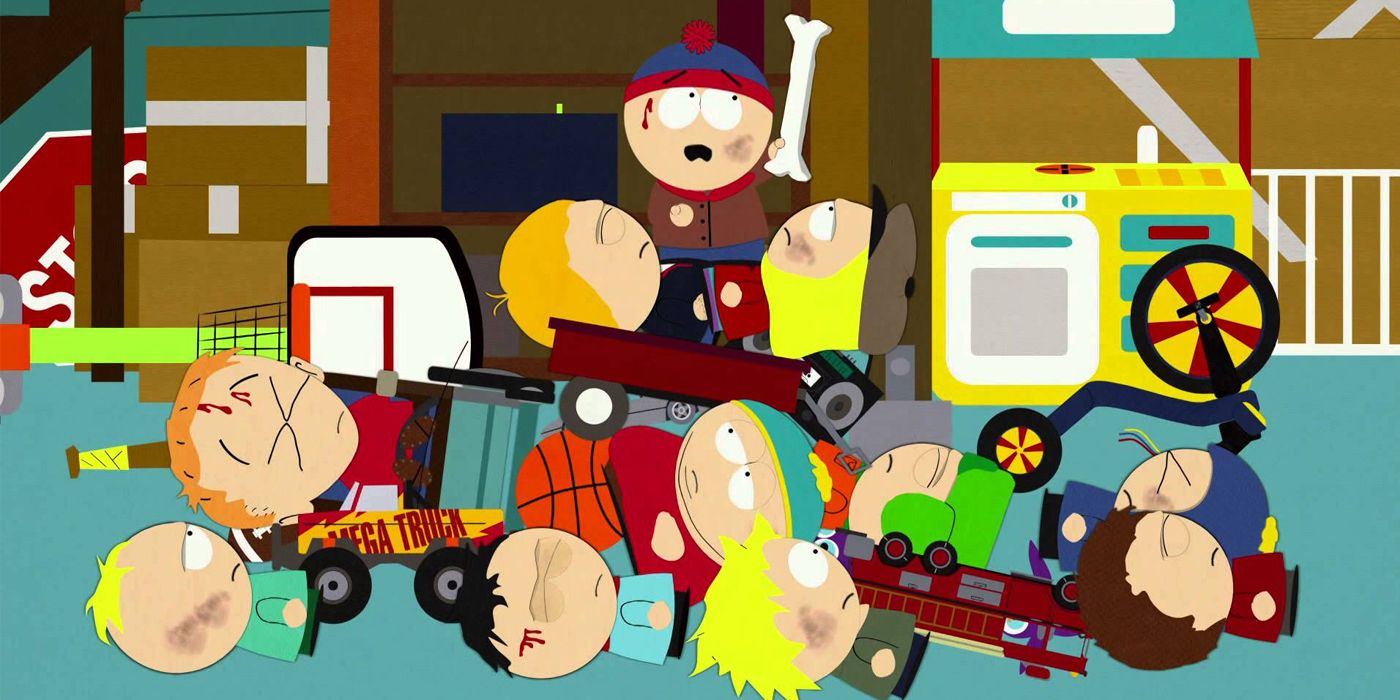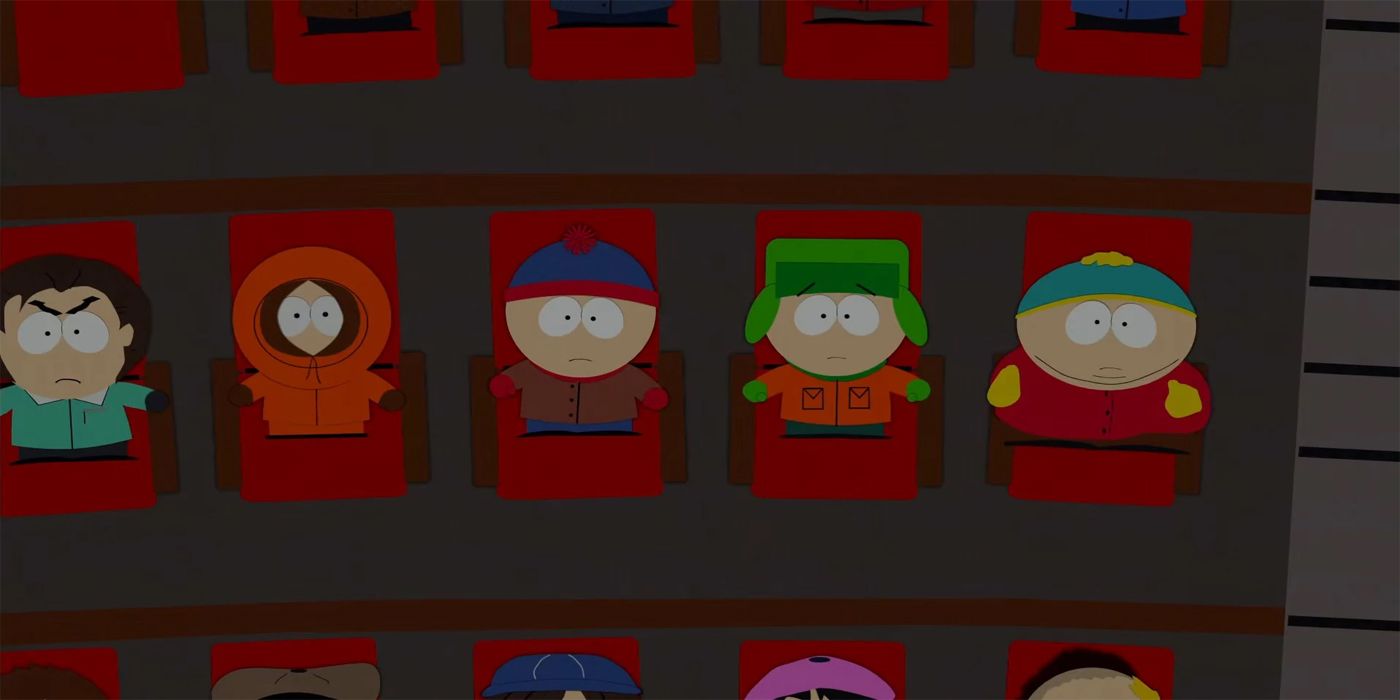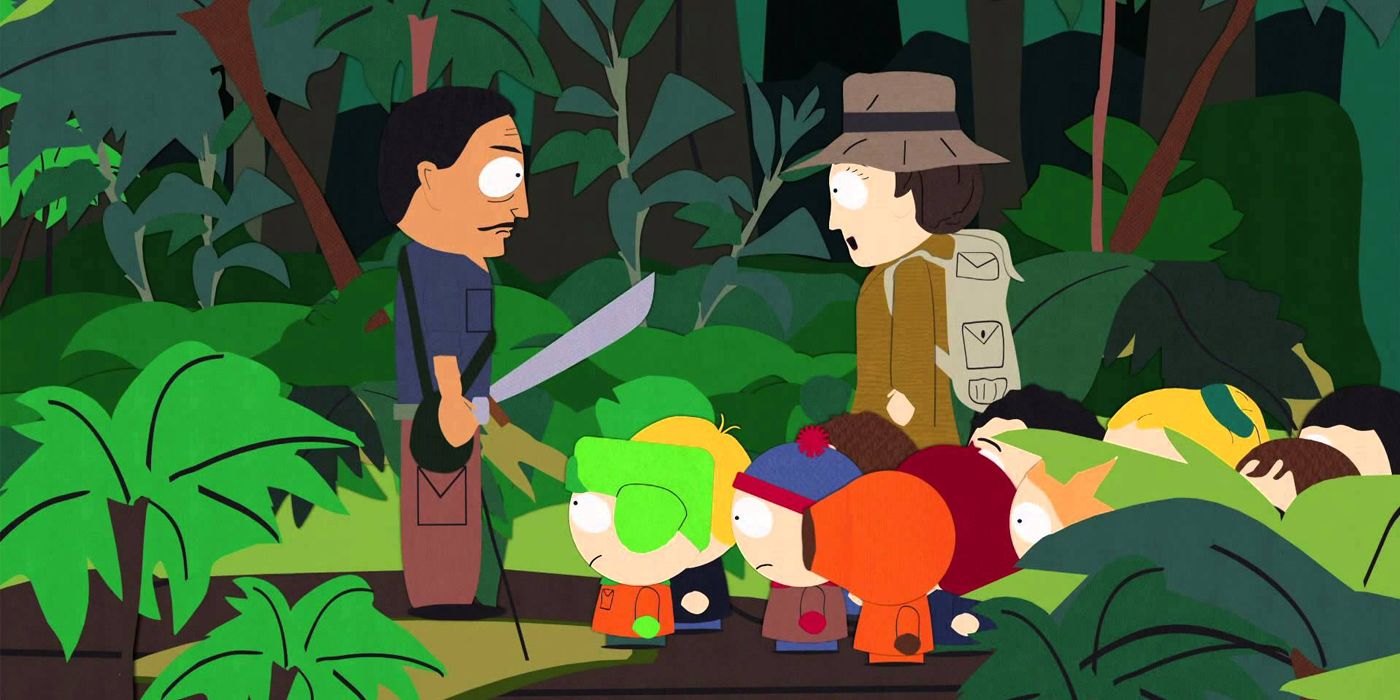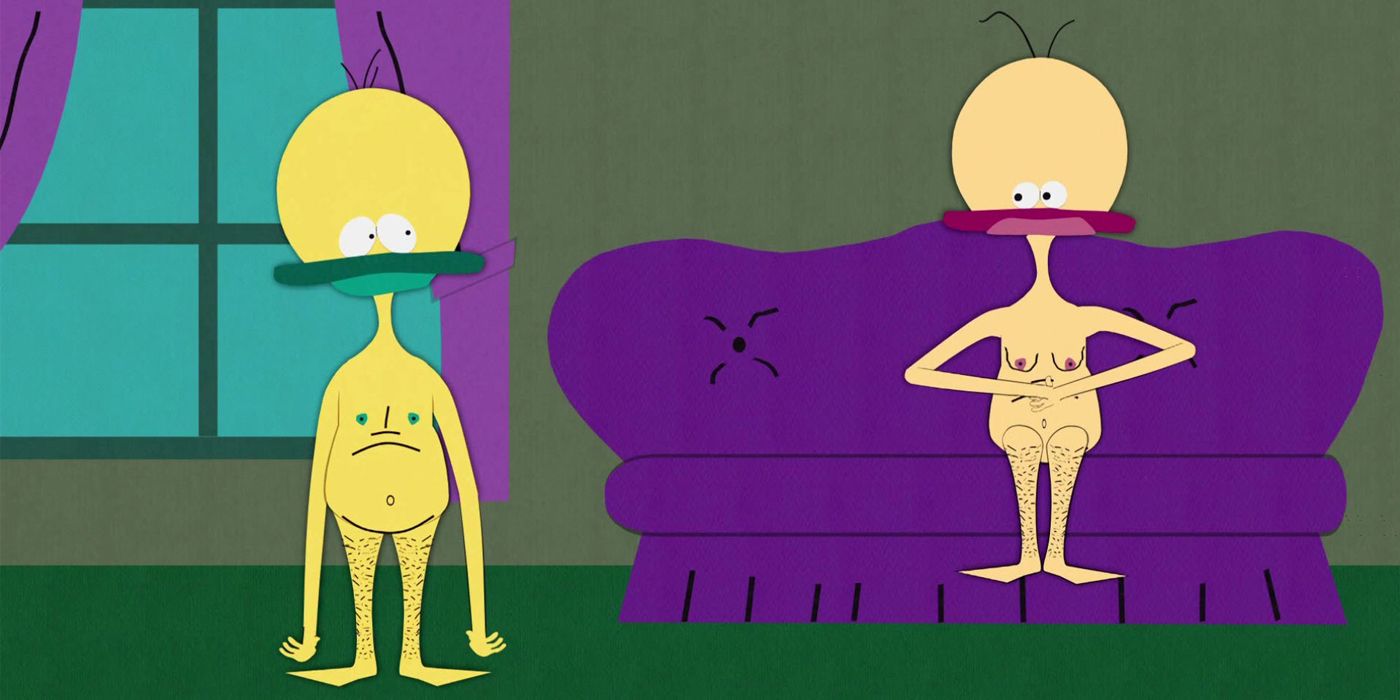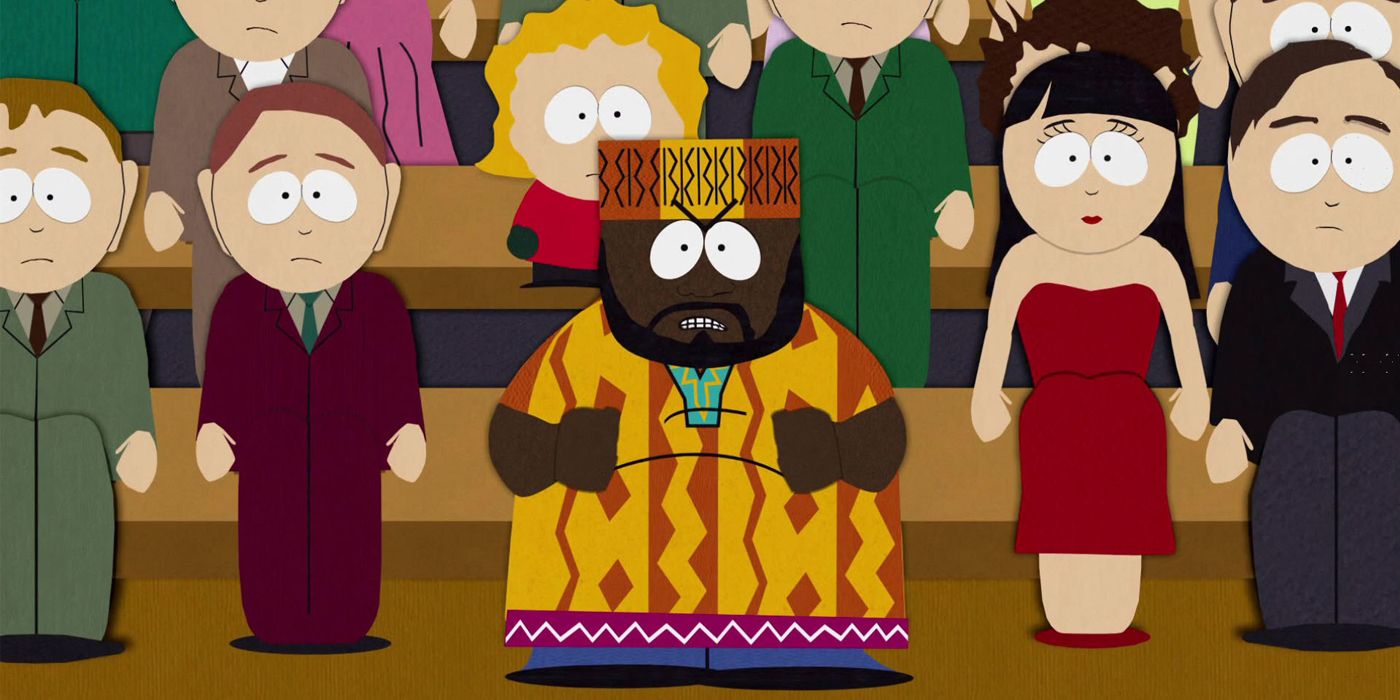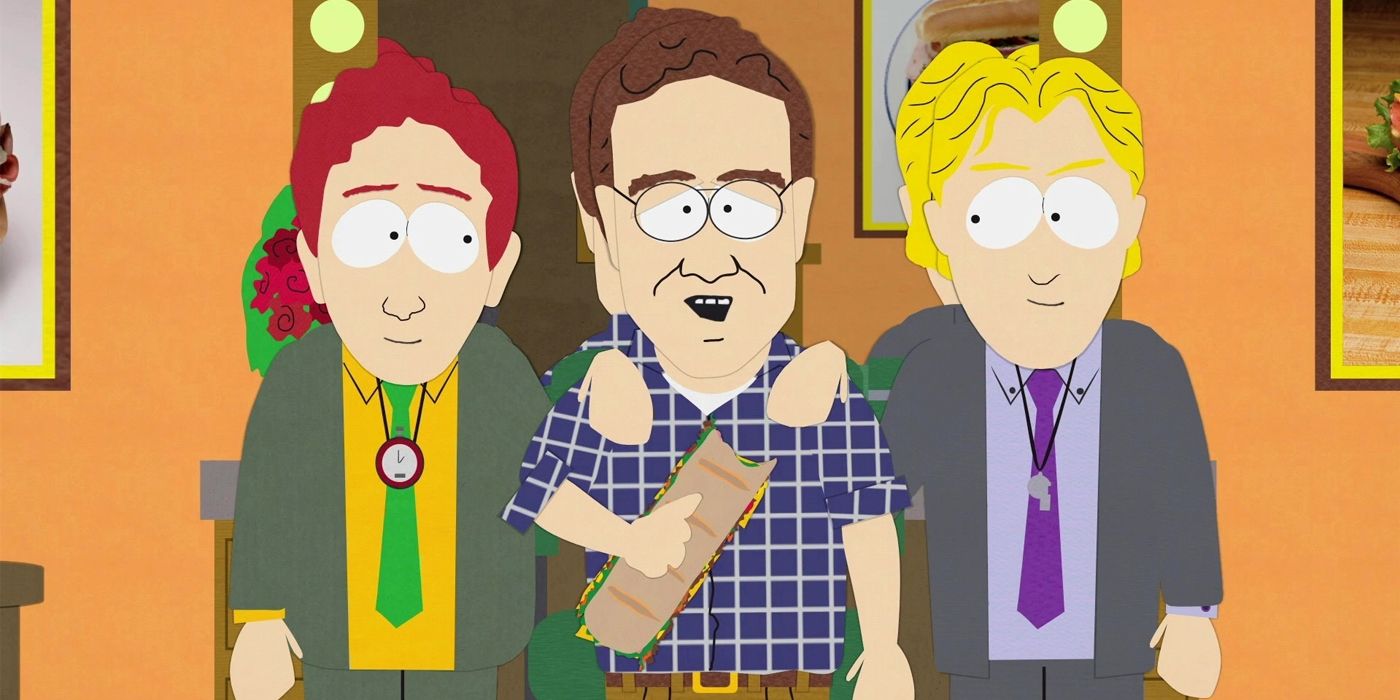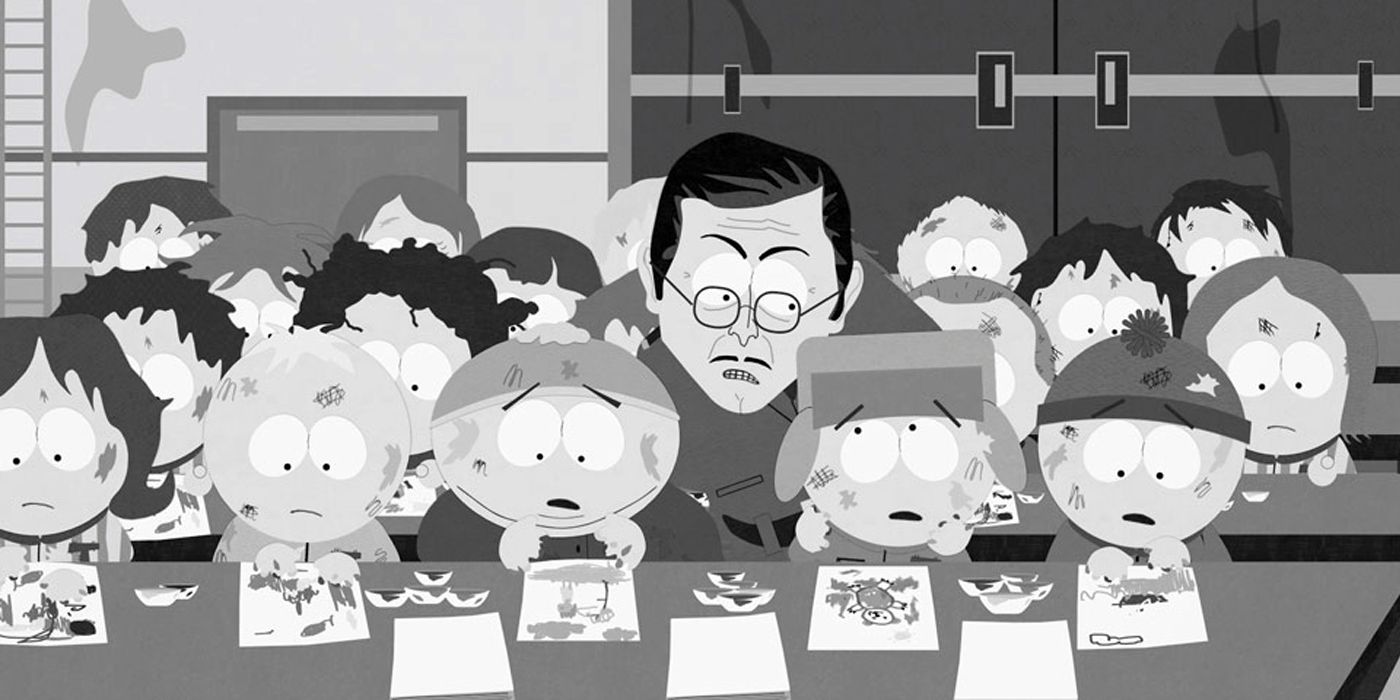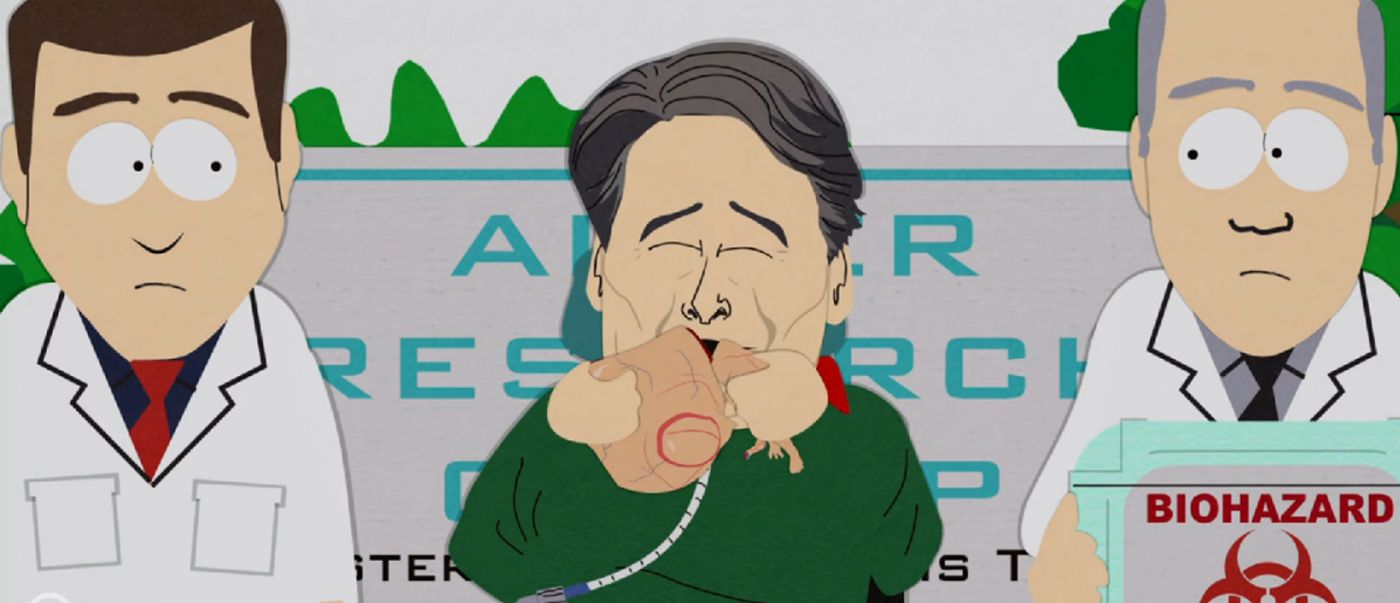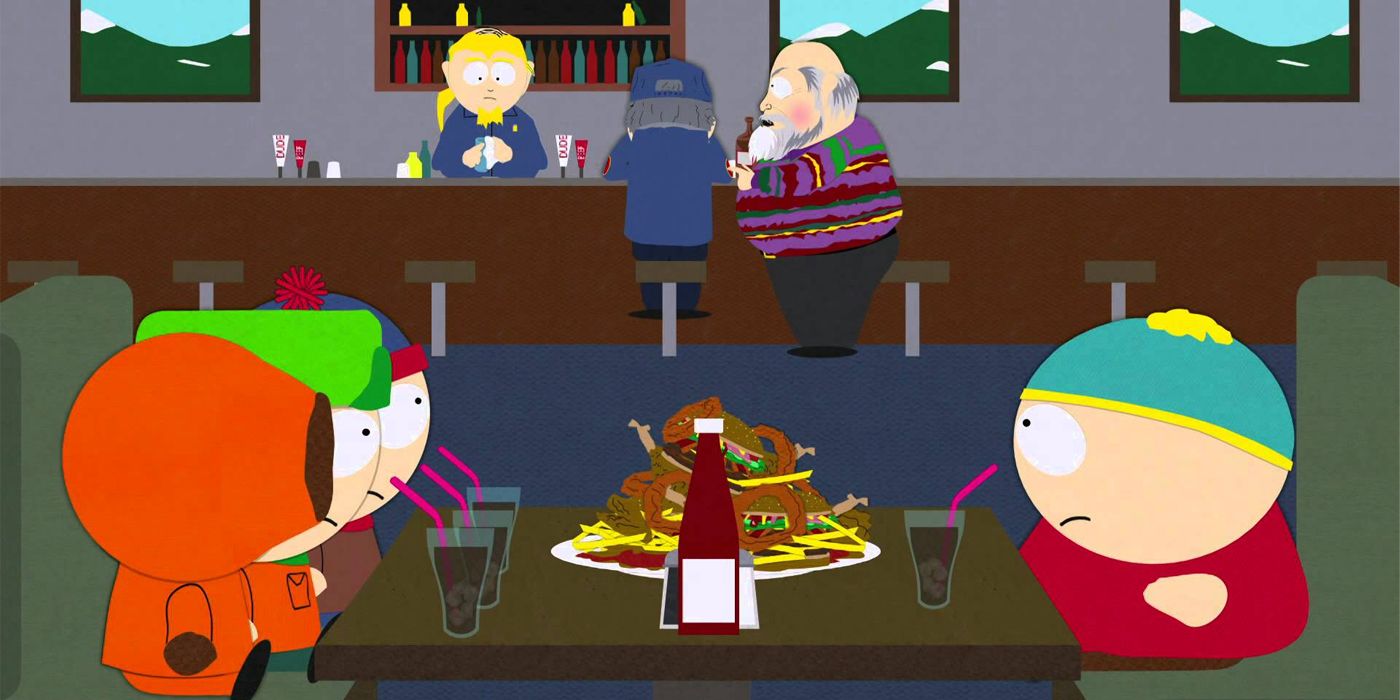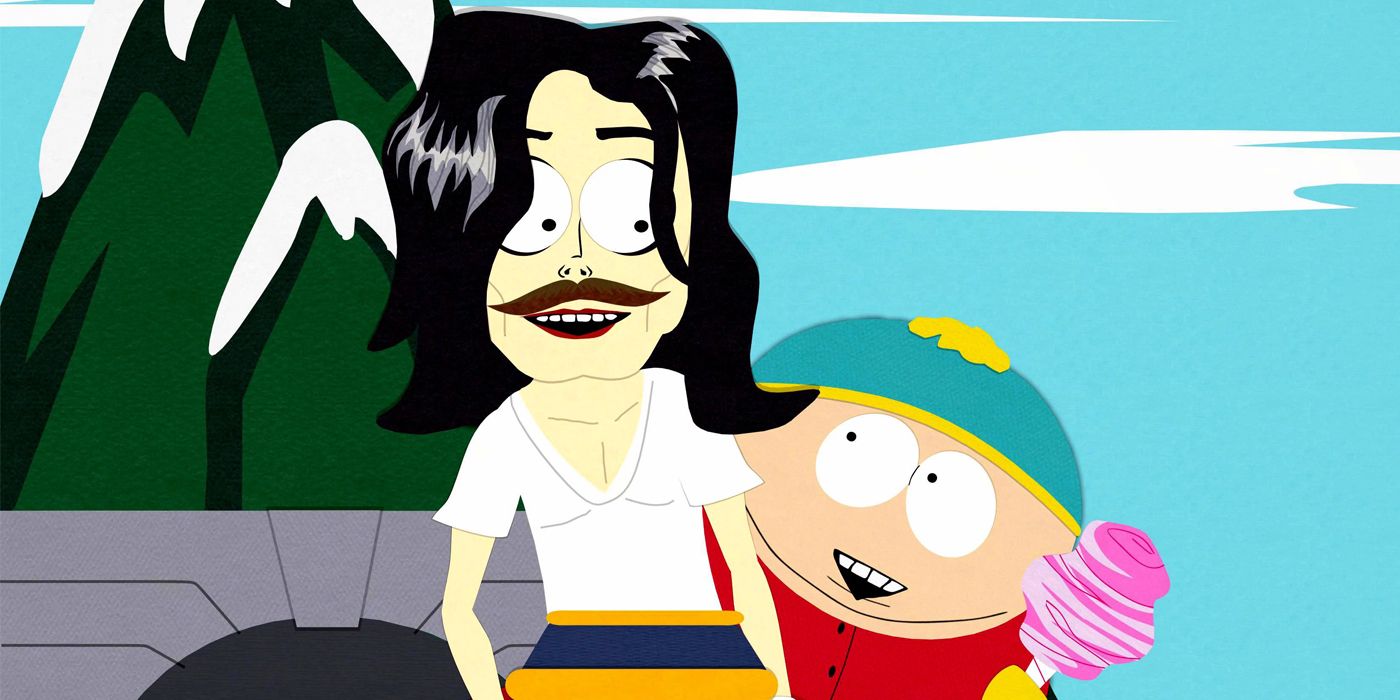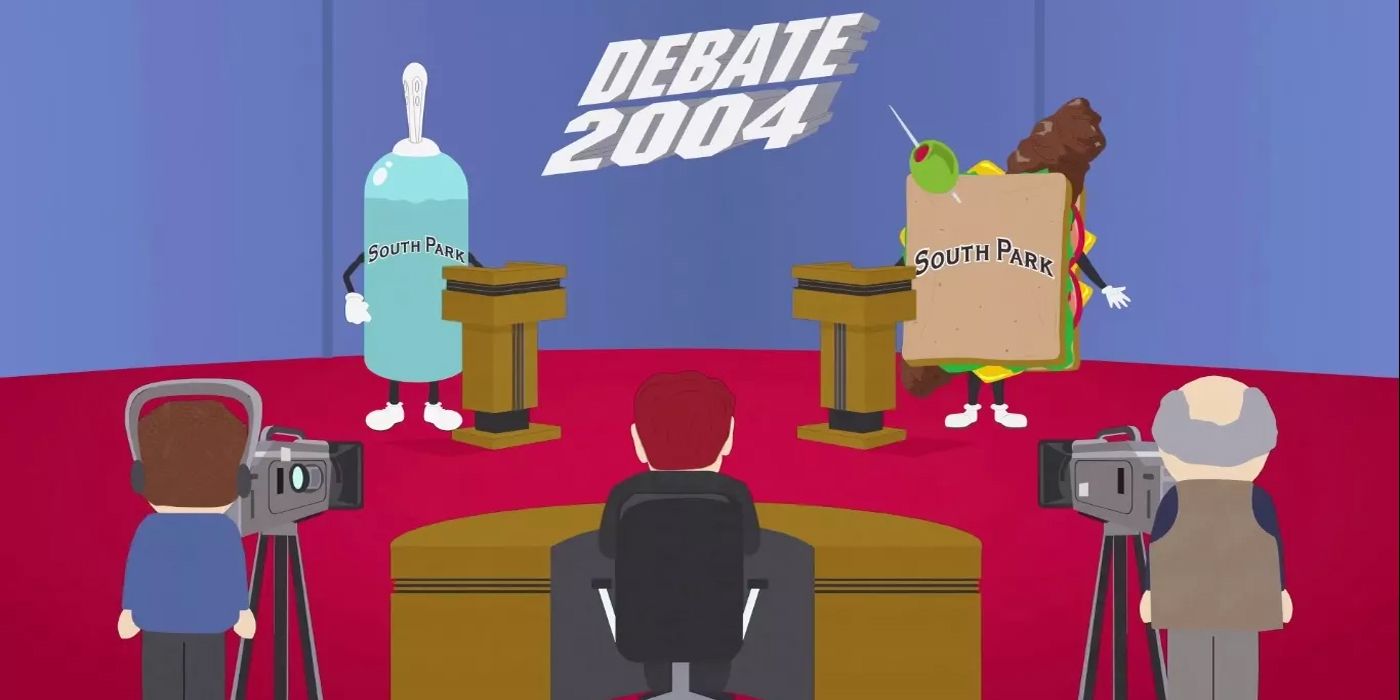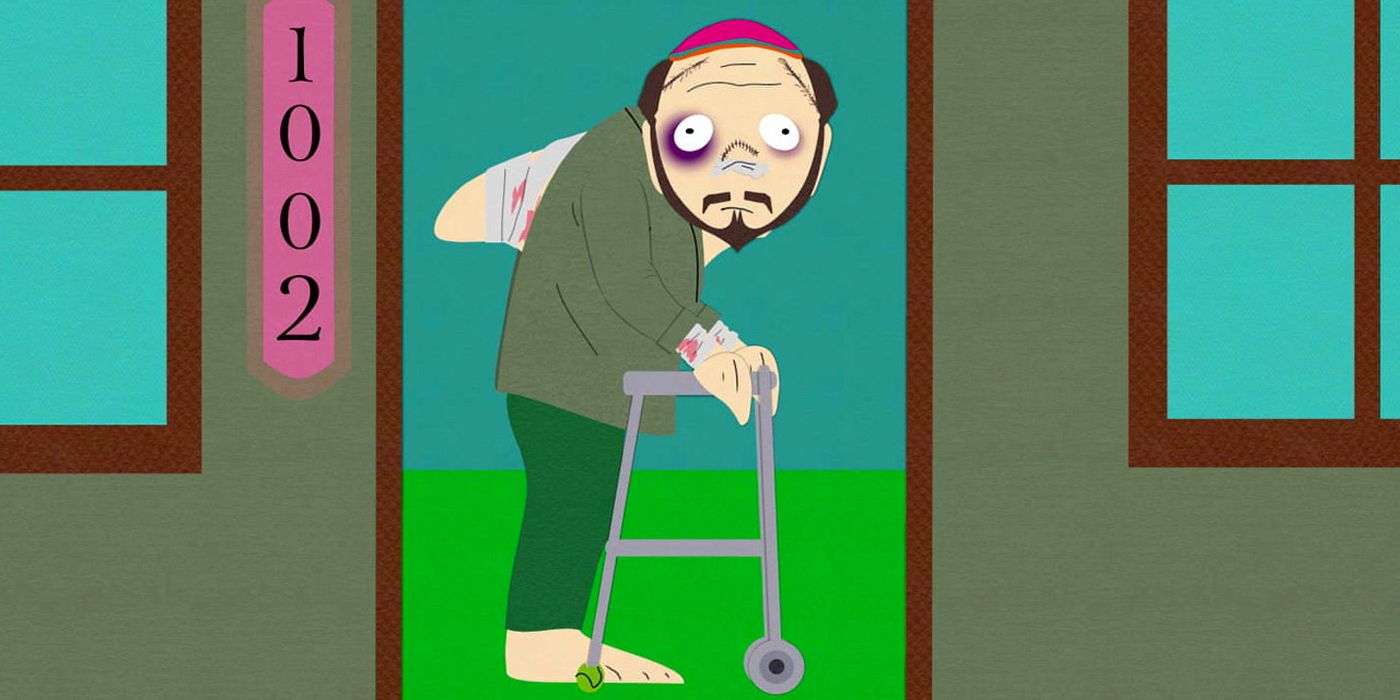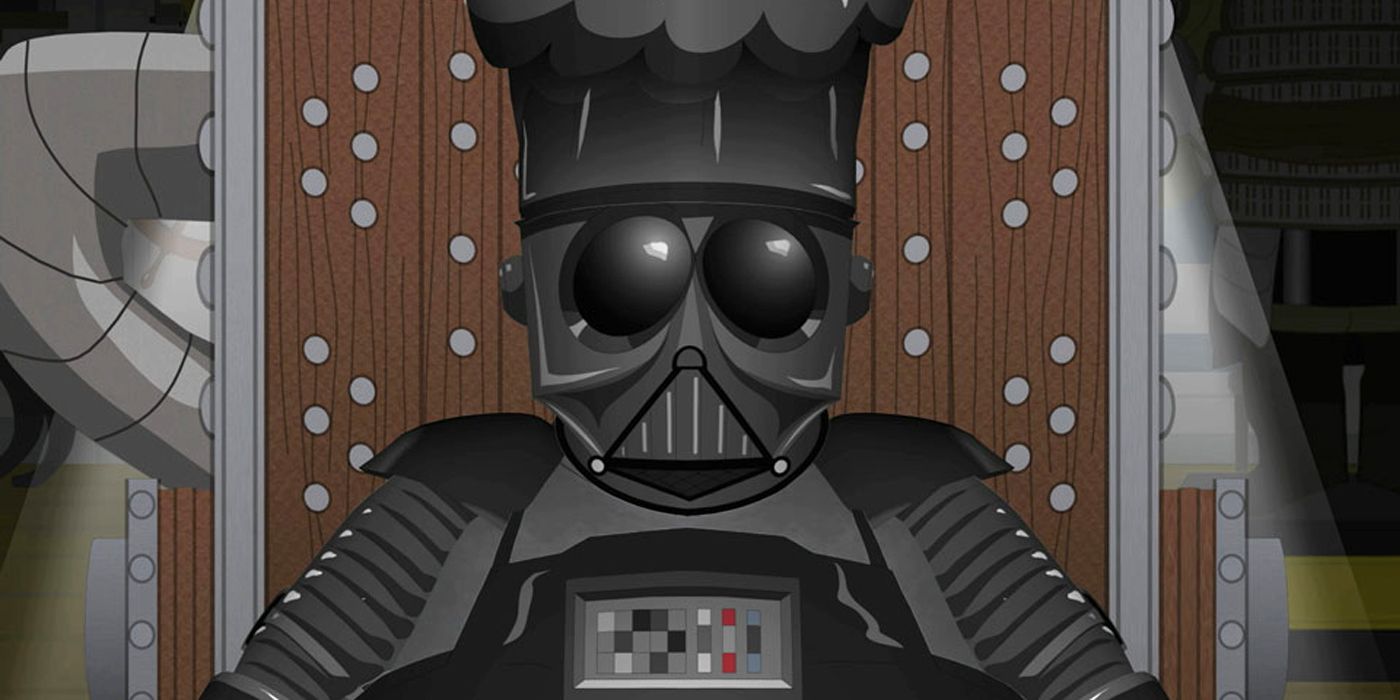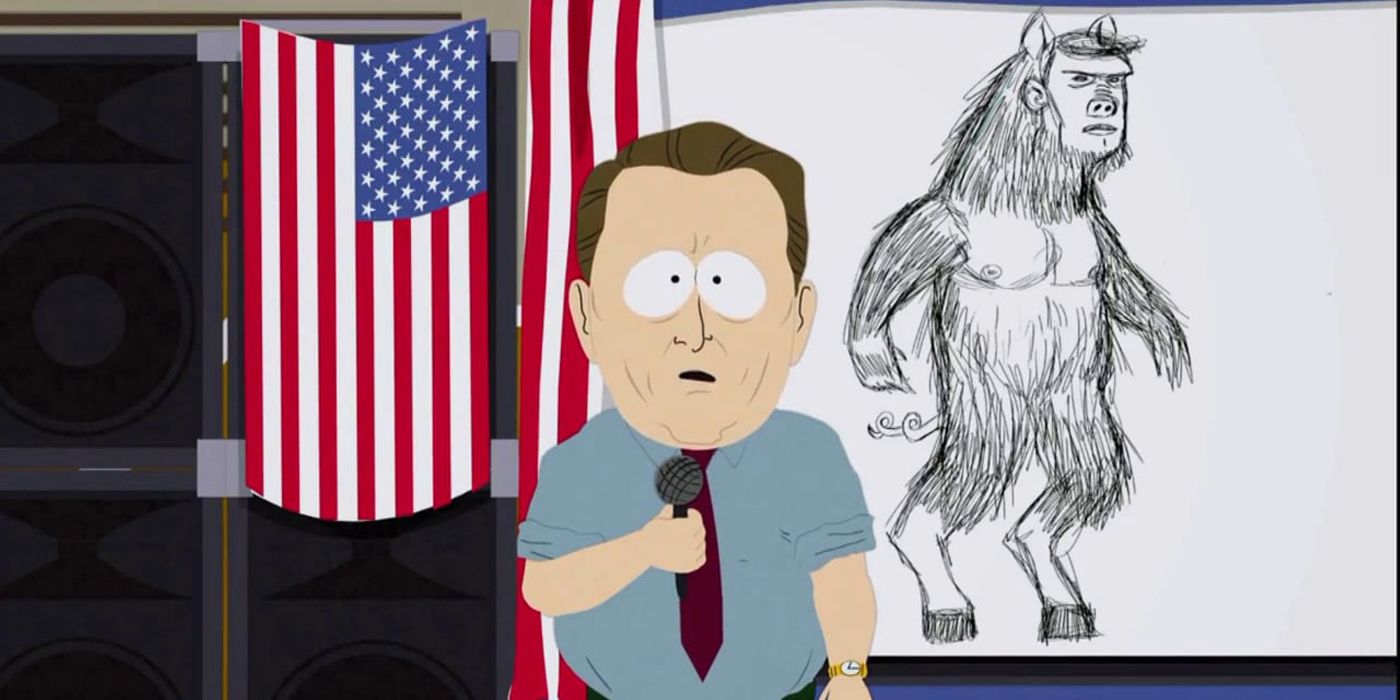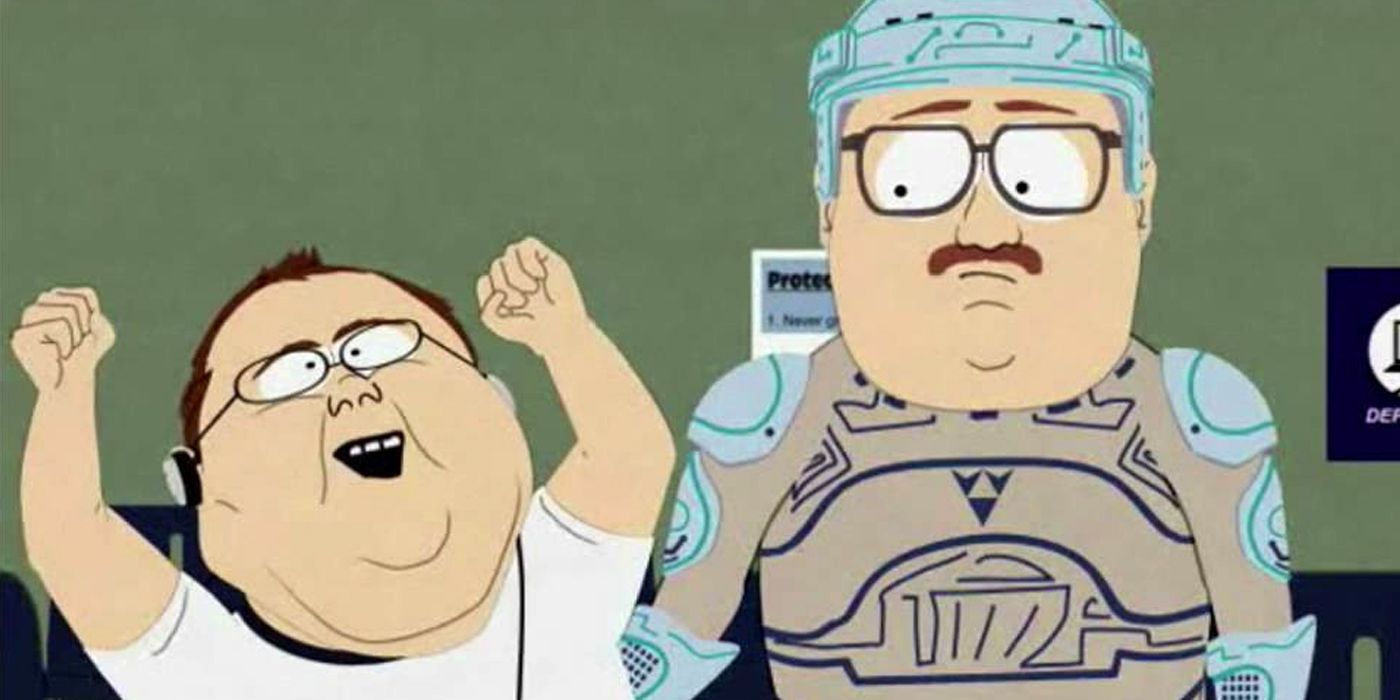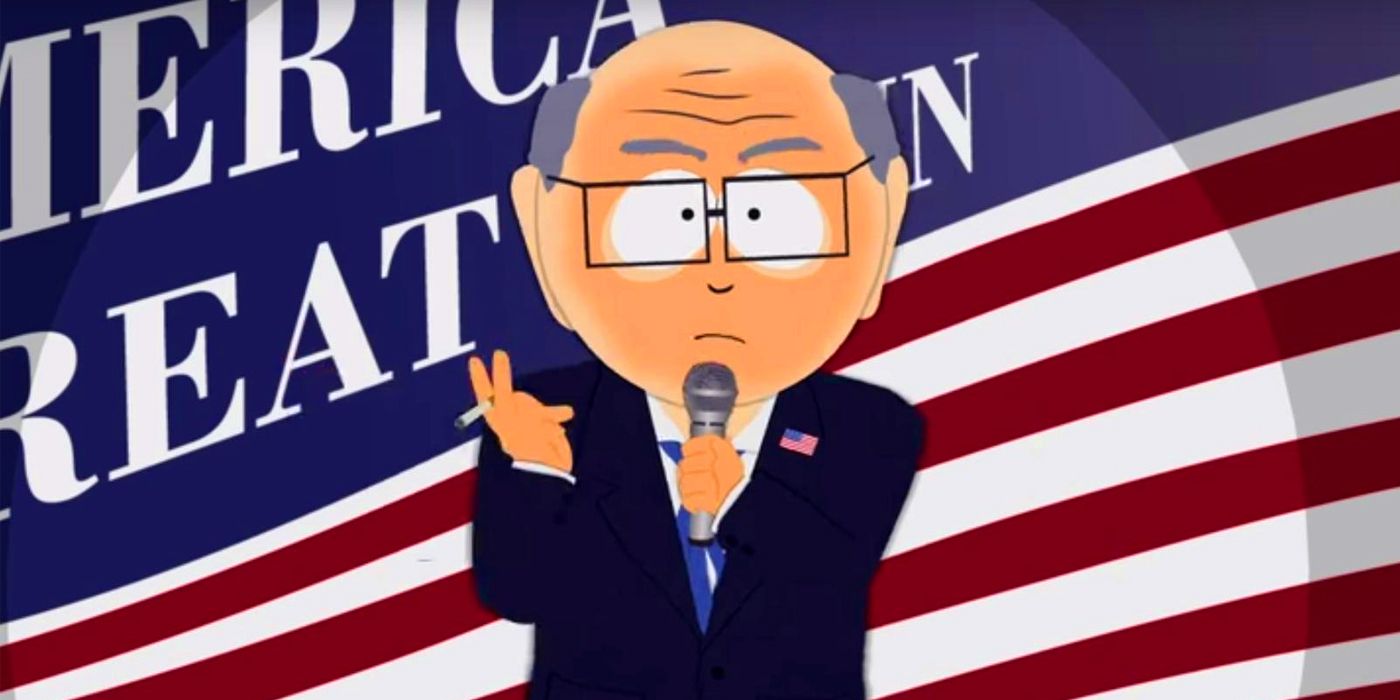At this point, the reputation of South Park as one of the more culturally-important television productions of the late-90s and early-to-mid 2000s is more than secure. The crudely-animated (originally by necessity, now by aesthetic design) series nominally following the lives of four foul-mouthed pre-teen boys living in the alternately depressing or bizarre Colorado town of the title has won awards, opened a hit movie, been nominated for an Oscar, and launched the show business careers of creators Trey Parker and Matt Stone; transforming them from Midwestern indie-film nobodies into in-demand Hollywood players whose musical The Book of Mormon remains one of Broadway's hottest tickets.
But as far as they've gone, South Park endures as a pet project that the idiosyncratic creators seem to view both as a kind of karmic burden (as suggested by episodes like "You're Getting Old" and "Ass Burgers") and a useful tool for venting their own personal cultural and political hangups to a mass audience. The series has proudly earned a reputation as a pop-culture agent-provocateur, eager to take mean-spirited swipes at almost any institution, idea or even individual person irrespective of political alignment or the potential for "collateral damage" - in some respects pre-figuring the directionless mayhem-for-mayhem's sake chaos humor now practiced by denizens of web-cultures like 4chan and Reddit. It's an approach made possible by the series' accelerated production schedule, which allows Parker and Stone to add their in-the-moment takes on controversial topics to new episodes in a much more timely manner than any other pre-recorded TV series animated or otherwise.
However, getting a "fresh take" also means getting a take without a lot of time or consideration spent on the broader implications of what's being said - or whose ox is being gored. Combine that with the creators' proudly-stated love of ticking off "both sides" of any given issue and it's no surprise that, while the series has continued to produce strong episodes, the march of time and concurrent transformation of societal norms have transformed some of its most iconic moments from "shockingly funny" to awkward, uncomfortable or even downright hard to watch. With that in mind (and without any prejudice beyond reason to the "philosophy" of the material in question) here are fifteen infamous South Park moments that just don't play like they used to.
15. ROGER EBERT SHOULD LAY OFF THE FATTY FOODS (Season 2 - Episode 11)
Here's the thing about mercilessly mocking celebrities on your just-for-yuks cartoon show: If you run long enough, you're going to end up dealing with having "knocked around" someone whose legacy changes dramatically after they pass away.
That's certainly the case with the late film critic Roger Ebert. While probably the world's most famous movie critic apart from his partner Gene Siskel in life, Ebert's profile was elevated from pop-culture novelty to giant of his field when he soldiered on after his body was ravaged by cancer. When he passed away, he became something like a Patron Saint of American film criticism - especially to the generation of younger writers who he mentored in his final years as support-writers for his popular website. All of which goes to make the title of "Roger Ebert Should Lay Off The Fatty Foods" read (fairly or not) as petty in a rather less humorous light than intended... especially when you consider that Ebert doesn't appear or figure into the episode in any way, and the title's main purpose is to snipe the critic for giving a thumbs-down to Baseketball; a sports comedy from the same year that Parker and Stone have since spent considerable time mocking themselves.
14. RAINFOREST SHMAINFOREST (Season 3 - Episode 1)
A good rule of thumb for tracking the development of South Park storylines is that whatever the major issue of the day is, Trey Parker and Matt Stone will find a way for South Park to be on the other side of it - sometimes with the noble comedic intent of goading an audience to take a second look at even their positive biases, but much of the time because the pair seem to relish their "culturally unwelcome" (or at least as "unwelcome" as millionaire Broadway producers can be said to be) reputations.
1999's "Rainforest Shmainforest" certainly felt like the later, even at the time: Ostensibly a riff on Parker's dislike of a vacation to Costa Rica, the episode is mainly an indulgence in sniping South Park's favorite target: People in the entertainment industry not named Trey Parker or Matt Stone, specifically environmental activists and the focus that community had placed on rainforest preservation throughout the 1990s. But while the episode itself remains amusing, viewers not around at the time are likely to be surprised to hear that rainforest activism - now widely accepted as a key aspect of mainstream climate science and biodiversity maintenance disciplines - was ever particularly controversial in the first place.
13. JAKOVASAURS (Season 3 - Episode 4)
One of the earliest enshrinings of Parker, Stone and South Park's now-legendary comic prescience came at the expense of Star Wars: Episode I character Jar-Jar Binks. Intuiting from the CGI-animated sidekick's presence in the film's trailer - specifically his delivery of the line "Issa people gonna die!?" - that audiences would end up hating Binks, the pair stuck an imitation of the line into the mouth of a background character in a similar scene in the South Park: Bigger, Longer & Uncut movie - making the feature-film spin-off feel downright cutting edge by spoofing The Phantom Menace's unexpectedly negative reception earlier than almost anyone else. "Jakovasaurs," produced around the same time, expanded the creators' dislike of Jar-Jar across a whole episode wherein the town is besieged by strange creatures who mimic the character's behavior.
However, a funny thing has happened to the popular culture in the almost two decades since Jar-Jar Binks' debut: Star Wars fandom has grown by leaps and bounds, and while "original" Gen-X fans like Parker and Stone tend to be reliably hateful of the character; that same hate doesn't seem to be widely shared by the younger generation of fans who grew up with Binks (and The Prequels) as just one more part of the expansive Star Wars universe rather than a "let-down" after the long post-Jedi wait - and one can only imagine that those same fans might wonder what, exactly, the episode-length joke of "Jakovasaurs" is actually meant to be in the first place.
12. CHEF GOES NANNERS (Season 4 - Episode 7)
At its best, South Park is a machine that skewers cultural taboos; and its absolute favorite is deflating the "Spielbergian Ideal" of childhood and children as the decent and innocent state of humanity as embraced by the Boomer and Gen-X generations as not only (in Parker and Stone's view) false but the very engine that creates venal, destructive little creeps like Eric Cartman. But even they aren't immune to "a small child shall lead them" storytelling, and that's precisely how "Chef Goes Nanners" pays off: With a brewing race war over a proposal to retire South Park's town flag (which depicts the lynching of a Black man by a white mob) thwarted by the realization that the wrongly presumed-racist boys were actually so "post-racial" in their outlook that the connotations of the flag never occurred to them. The story, obviously, was based on then-current controversies about retiring U.S. State and County flags that incorporated the Civil War-era Confederate Battle Flag.
It's one of the better uses of the series' maxim that everyone in South Park is stupid - even the good guys - as a plot device. But while the question of what to do about State-backed Confederacy-nostalgia was largely viewed as a niche ideological debate at the turn of the Millennium, the issue has intensified in recent years and turned decidedly against the of "let's calm down about this" resolution South Park (however irreverently) arrived at; to say nothing of the rather cringey-feeling "Being aware of racism made me the real racist!". Today, the forcible dismantling of Confederate monuments is an increasingly widespread policy - and so are protests against such dismantling tinged with (real and often frightening) racist invective that's a far cry from the "well meaning but dumb traditionalists" embodied by Jimbo and Ned in Nanners.
Today, the forcible dismantling of Confederate monuments is an increasingly widespread policy - and so are protests against such dismantling tinged with (real and often frightening) racist invective that's a far cry from the "well meaning but dumb traditionalists" embodied by Jimbo and Ned in "Nanners." Obviously, it's unreasonable to expect a 17 year-old TV episode to have stayed "current" with 17+ years of societal progress; but that doesn't stop this from being one of the more awkwardly ancient-feeling South Park classics.
11. JARED HAS AIDES (Season 6 - Episode 1)
There's an old joke that the formula for comedy is "Tragedy + Time" - but sometimes it works in reverse.
Jared Fogle was a guy who became famous by claiming that he owed a substantial weight loss achievement in part to eating regular meals at the Subway sandwich shop chain and subsequently got hired as the actual spokesman for the company. "Jared Has Aides" is built around the conceit of the South Park boys causing the spread of a rumor that Fogle actually owed his weight loss to having AIDS when he actually attributes the loss to having "aides" as in assistants. Cute wordplay, not a particularly memorable episode otherwise.
Now, on the other hand, the episode just feels a hundred different kinds of uncomfortable given how much interaction the animated Jared spends around the South Park children: In 2015, the real-life Jared (who did not sanction or provide a voice for the episode) plead guilty to possession of child pornography and having solicited minors for sex - and is now serving a 15 year federal prison sentence. Not at all South Park's "fault," of course, but the fairly gentle (for South Park) goofing on someone who turned out to be a literal monster plays pretty awkward all the same; which is why it wasn't too surprising when the "character" (who was also a celebrity cameo in the reference-packed 200th episode) popped up again in a much more explicitly villainous context in Season 19.
10. DEATH CAMP OF TOLERANCE (Season 6 - Episode 14)
One could probably have put this whole list together with only Mr. Garrison-centric episodes. As South Park's avatar of self-hating sexual repression, Garrison has been the frame on which Parker and Stone have hung their in-the-moment punching bag stand-ins for whatever the perceived "cause celebre" sexuality issue of the day happens to be: first a closeted gay man, then an out-and-proud gay man using his minority status to bully people, then a transgender woman doing much the same, now a stand-in for Donald Trump (we'll get to that); pretty much every Garrison storyline comes pre-packaged with the expectation of uttering "wow - that was considered an acceptable characterization then?" at least once.
"Death Camp of Tolerance" is considered one of the series' turning-point moments, where the most common target of Parker and Stone's ire was gradually switching from needling conservative bugbears to prodding the "sacred cows" of their largely progressive-leaning showbiz contemporaries - a move that served to (for a time) differentiate the irreverent series from their TV comedy peers, who had otherwise largely united around knocking the Bush Administration. The premise is clever enough: Mr. Garrison performs increasingly obscene gay sex acts in his classroom in a bid to get fired and sue for discrimination, but the kids are punished for being "intolerant" of his sexuality instead.
But over a decade later, divorced from the "it's funny because every other media entity is passionately on the other side of this - aren't we just incorrigible scamps?" context of the day (and with hard-fought protections from workplace bias for LGBTQ citizens once more being described as an imperiled hot-button issue under the Trump-era justice department) it's probably understandable that modern audiences too young to recall said context (and probably plenty who recall it just fine, too) may find revisiting "Death Camp" about as uncomfortable as Parker and Stone's generation likely would've found circa-1960s editorial cartoons mocking the Civil Rights Movement.
9. KRAZY KRIPPLES (Season 7 - Episode 2)
If your brand was "we'll hit anyone, especially if we're told we're not supposed to hit them" in 2003, you couldn't find a better way to prove that mettle than making a target of Christopher Reeve. Already beloved by at least two generations as the star of the Superman movies, the actor became something like a pop-culture saint via his passionate activism for the disabled after becoming paralyzed in a tragic horse-riding accident. Circa-"Krazy Kripples" (the main storyline of which is a parody of urban gang movies built around handicapped characters Timmy and Jimmy), Reeve had managed to court nominal controversy by advocating on behalf of stem-cell research due to its potential to reverse the effects of paralysis like his - which opened the door for Parker and Stone to show off their "nothing sacred" bonafides.
That's not to say that the joke of his B-story (Reeve consumes human fetuses in order to not only regenerate his body but gain Superman-like powers, ultimately becoming a supervillain and feuding with former co-star Gene Hackman - all while continuing to be described as "inspirational" by the media) wasn't amusing - even if real-life disabled activists weren't laughing at the "you've got to play the hand your dealt" moral message. But when Reeve passed away only one year later, "Krazy Kripples" became one of the series' hardest to watch re-runs - and age hasn't been kind to the overall tone of it.
Next: Butt Out, The Jeffersons, and Douche and Turd
8. BUTT OUT (Season 7 - Episode 19)
Let it never be said that South Park won't take shots at itself. "Butt Out" uses the broad context of a storyline about a smoking ban in order to goof on politically-active left-wing celebrities (again), but it's really an opportunity for Parker and Stone to wink back at the audience about how predictable their own Merry Contrarian "issue episodes" were already becoming: Kyle is able to predict the entire arc of the episode, from the absurdly positive depiction of the cigarette factory to the unnecessarily cartoonish villainy of the Rob Reiner-led celebrity villains to the "townspeople mob led by Kyle's mom" finale. What renders the episode prehistoric-feeling, then, is the mere idea that smoking bans were an unusual or especially controversial subject at one point - today such ordinances are fairly widespread in the United States, particularly in developed cities; and it's not uncommon for even small communities like South Park to enact some of the policies "Butt Out" presented as semi-radical.
7. THE JEFFERSONS (Season 8 - Episode 6)
Your mileage may vary on the "appropriateness" of joking about the seemingly still barely-understood strangeness of the final years in the life of pop superstar Michael Jackson, but one thing that can't be denied is that (like it or not) the public perception of the musician was rendered overwhelmingly more positive following his unexpected 2009 death. A concert-planning documentary opened wide in theaters, his albums returned to the top of the charts and once again appeared on both radio and music-television stations that had dialed-back on featuring his work following the scandalous allegations of the late-90s.
"The Jeffersons," effectively one long joke at the expense of Jackson's bizarre behavior of the time (excessive plastic surgery, odd parenting decisions) played as one of the lighter South Park episodes of its era; but with Jackson now passed and the enabling of his bizarre behavior by opportunistic doctors being popularly considered as a contributor to his death, this and other Jackson-oriented humor of the day has been retroactively cast in a decidedly different light.
6. DOUCHE AND TURD (Season 8 - Episode 8)
In 2004, it felt as though the entirety of the entertainment industry (apart from maybe country music and the membership of the Blue Collar Comedy Tour) had united behind a "Vote or Die" activist push ostensibly aimed at driving turnout among young voters but - implicitly - aimed at ousting controversial President George W. Bush from office owing to the overwhelmingly greater likelihood of younger voters to back his Democrat challenger John Kerry. True to form, Parker and Stone took it as an opportunity to reaffirm their performative outsider status, publicly proclaiming that they saw no difference between the candidates (they didn't like either) and encouraging fans to be unashamed of non-voting in various public interviews.
This all became a popular news item, particularly owing to Moderate-Conservative political columnist Andrew Sullivan having famously nicknamed Generation-Xers disaffected about American progressivism as "South Park Republicans" years earlier - and it earned South Park the first real sustained criticism they'd received from the "left flank" of the media (which had previously treated their needling in mostly good humor if acknowledged at all.) Parker and Stone's response was "Douche and Turd," effectively an episode-length comedic manifesto calling South Park loyalists to their aid.
Whether or not the dressing-down of "Vote or Die" had much effect on the election is unclear at best, but given the episode's broader "there's no difference, voting doesn't matter" ethos started to feel dated with each new controversy (whatever side of them you were on) that enveloped the second term of the Bush Administration. Four years later, record high youth voter turnout among Millennials would be cited as a major factor in the historic victory of Barack Obama; while "Douche and Turd" - for a moment the most talked-about South Park episode ever - feels more like a relic than almost any other post-9/11 installment of the show.
5. MR. GARRISON'S FANCY NEW VAGINA (Season 9 - Episode 1)
Let's not dance around it: Over the past decade, widespread understanding and normalization of Transgender persons and gender-reassignment surgery has increased to a degree which is nothing short of incredible given how long such cultural shifts have taken in the past. As such, even if one were sympathetic to what seemed to be South Park's outlook on the matter - i.e. reassignment-surgery being "gross" and the idea of people insisting otherwise being innately funny, likening it to surgically altering one's race or species (and the implicit suggestion that Garrison's womanhood is similarly invalid as Gerlad Broflovsky becoming a dolphin) by now you'd probably be aware that this puts one decidedly outside the mainstream of the cultural discourse of today.
Given that, there just isn't much getting around it: While Parker and Stone (who later claimed that most of the episode's plot came from not having any ideas for the new season and being up against a deadline) may indeed having been reflecting a then-"mainstream" view of gender-reassignment as unusual or confusing, the cultural winds have changed course dramatically on the subject. And while (once again) one can't expect any TV show to inoculate itself against every potential leap forward in social progress, "Mrs. Garrison's Fancy New Vagina" is easily one of the hardest to revisit moments in the modern South Park canon.
4. THE RETURN OF CHEF (Season 10 - Episode 1)
Parker and Stone's much-ballyhooed battle with The Church of Scientology after mocking the controversial religious sect in the classic episode "Trapped in The Closet" had an unexpected side-effect: It drove longtime collaborator and practicing Scientologist Isaac Hayes, the voice of Chef, to quit the series. The duo's response is the stuff of TV legend: Repurposing old voice-clips from Hayes' earlier appearances, they created an episode where Chef returns from a sudden absence having been brainwashed by a "fruity little club" whose members believe that molesting children will make them immortal. Chef winds up dead, killed-off in spectacularly gory fashion, but with a post-script indicating that the evil Super Adventure Club had resurrected him as a Darth Vader-like cyborg.
Unfortunately, despite the implications that "Darth Chef" might become a new recurring villain, any plans for such seemed to have been scuttled when Hayes died of a stroke a few years later. While a zombie version of Chef appears in the Stick of Truth video game, almost all reference to the character is absent from subsequent seasons - rendering the otherwise extremely funny episode a somewhat grim euology rather than the snarky-strikeback it was intended as.
3. MANBEARPIG (Season 10 - Episode 6)
The recurring theme of South Park's ethos from about Season 7 on was that if "Hollywood" was onboard with something, Trey Parker and Matt Stone wanted you to know they were either against it or just simply too cool for school. So when former Vice President Al Gore re-emerged in his "civilian" role as a leading advocate for climate change activism and his landmark documentary about the same, An Inconvenient Truth, became a topical sensation; South Park featured him as an attention-starved crackpot who nearly gets the boys killed in his pursuit of an unlikely-to-exist cryptid described as "Half man, half bear-pig."
Is it a funny episode? Absolutely - returns to the original "potty-mouth kids on an adventure" setup of the series usually are. And given that Gore was otherwise so enthusiastically feted by the entertainment world (Futurama, another contemporary prime-time 'toon, featured a Gore renowned as "First Emperor of The Moon and Inventor of The Environment") he can certainly stand a relatively modest ribbing like this. Unfortunately, as has become der-rigueur for South Park, "Manbearpig" and its attendant iconography were quickly embraced by the (real-life) climate-denial community, which has made re-runs more than a little awkward by association it gives the increasing unity of the scientific world on the matter.
2. CANADA ON STRIKE (Season 12 - Episode 4)
If you have to ask "Would South Park (effectively) cross a picket line?" you clearly didn't read the rest of the list.
Having established South Park as a non-union production and never joining any of the Hollywood labor guilds themselves, Parker and Stone sat out the 2008 Writers Guild of America strike (which was called, in part, to renegotiate the profit-sharing agreements for the increasingly-primary internet market) and then used this Season 12 episode to mock those who did strike in the form of a jokey Terrence & Philip adventure. That's probably still a sore subject for WGA members who didn't fit the episode's (implied) characterization of "Hollywood elites screwing themselves out of a better deal by complaining," but what truly dates the episode is the wall-to-wall jokes built around now-forgotten "e-celebrities" like Tron Guy and Star Wars Kid.
1. SEASONS 19 & 20 (The "Mr. Garrison Runs For President" Storyline)
Seasons 19 & 20 are mostly known for the breakout character "PC Principal" and the series' mixed-bag attempt at telling continuity-driven story-arcs, but what will probably be best remembered is how instantly-dated the Mr. Garrison storyline became when - for the first time anyone could really remember - Parker and Stone's ability to predict and adapt to the news of the day failed as badly as the rest of the media's did.
Looking back, it's all quite clear: Amidst all the continuity business about sentient ads and Member Berries, the two season-long storylines were once again preoccupied with aligning South Park as the naughty little boy perpetually tossing eggs at various strains of mainstream piety: So-called "political correctness," safe-space schools, Whole Foods gentrification, etc all came in for their whacks, making it crystal clear that South Park was expecting their long-time humor target Hillary Clinton to become President and for the show's humor to thus focus on 4 to 8 years joking at the expense of the same nominally-progressive incrementalism that had characterized the Obama era. True to form, they didn't really bother much with Republican candidate Donald Trump, instead having Mr. Garrison operate as a Trump-like surrogate who (as many had joked about Trump) was actively trying to lose the election.
Obviously, that's not how it worked out and the duo had to improvise even more than usual (in the appropriately-titled "Oh Jeez") in order to make the real-life election of the businessman-turned reality-TV-game-show-host to the presidency fit the story they'd set out to tell. Whether they "got there" or not is a matter for the critics, but it can't be denied that everything about the Candidate Garrison storyline leading up to "Oh Jeez" - all of it constructed around a sense that something somewhere in the political system would "kick in" and prevent a Trump presidency - plays in the post-election world like some of the most out of touch joking South Park has done in a long time. To date, it still doesn't appear Parker and Stone have worked out how to respond: The last time they were heard from on the matter, it was to announce that they were actually planning to do less political humor now that Trump was president.

